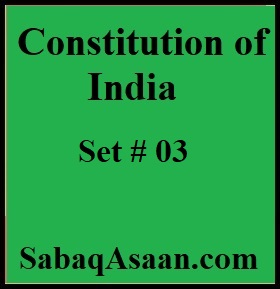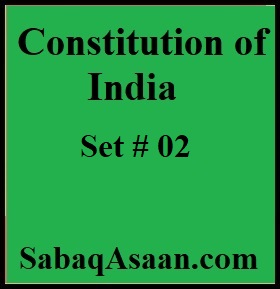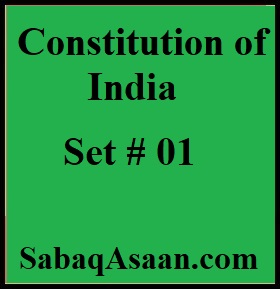Important Indian Policy and Constitution MCQs

1. The “Directive Principles” of State Policy included, in the Constitution of India, have inspired by, the Constitution of:
(a) USA,
(b) Ireland,
(c) Canada,
(d) Australia,
2. Which Article, of the Constitution, envisages free and, compulsory education for, children to the, age of 14 years?
(a) Article 45,
(b) Article 19,
(c) Article 29,
(d) Article 32,
3. The Fundamental, Right that aims, at the abolition of social, distinctions is the, rignt
(a) To property,
(b) To equality,
(c) Against exploitation,
(d) To freedom,
4. On whom does, the Constitution confer, special responsibility, for the enforcement ,of Fundamental Rights?
(a) Parliament,
(b) Supreme Court,
(c)President,
(d) State legislature,
5. In the Constitution, opportunities for the, development of scientific temper, humanism and spirit, of inquiry and reform, are found in:
(a) Fundamental Rights,
(b) Fundamental Duties,
(c) Preamble,
(d) Directive Principle,
6. Under which, Article of the “Constitution” are the Cultural and, Educational Rights granted,
(a) Article29 and 31,
(b) Article29 and 32,
(c) Article 29 and 30,
(d) Article30 and 31,
7. Which of the, following is not a, Directive Principle, of the State Policy?
(a) To raise the, level of nutrition.
(b) To promote economic, interests of weaker sections.
(c) To separate the, Judiciary from the Executive.
(d) To develop the, scientific temper.
8. Which of the, following is not a, Fundamental Right?
(a) Right to Equality,
(b) Right to Property,
(c) Right against Exploitation,
(d) Right to Freedom, of Religion,
9. Which part, of the Constitution, deals with the, Directive Principles, of State Policy?
(a) Part III,
(b) Part IY,
(c) Part V,
(d) Part II,
10. Protection and, interests of the, minorities is envisaged, in which Article of, the Constitution?
(a) Article 14,
(b) Article 19,
(c) Article 29,
(d) Article 32,


